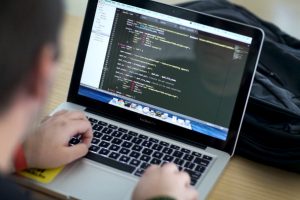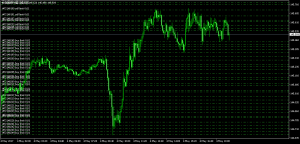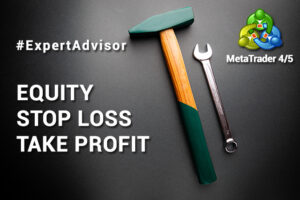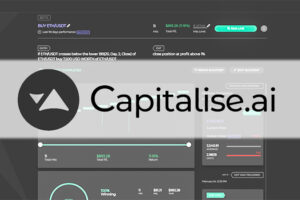Expert Advisor and the choice of a Forex broker
If you plan to use Expert Advisor (EA), you need to be aware that the choice of broker is one of the key factors in automated trading on Forex market. Often, it is the search for the right offer that will best meet our expectations that can decide whether trading turns out to be profitable or not. Of course, the more specific or unique type of trade we plan to use, the greater the impact on the effect can be the choice.
With very simple, simple strategies and a small amount of needs on the part of the trader, the choice of the broker will not matter much.
In today's article, we will consider choosing a broker to trade with Expert Advisors (EA). We will ignore the obvious issues such as security of funds, regulations and guarantees, customer support and capital requirements. You can read (and hear) about these issues here:
- How To Choose Your Forex Broker? - VIDEO webinar
- Choosing a broker - Polish or foreign
- It's time to choose the first broker
FOREX BROKERS - OVERVIEW
Investment style
There are several main types of machines, which are then divided into a whole mass of different variances. Nevertheless, in the case of the investment horizon, there is an identical division as in the case of manual trading. So we have systems available:
- Long-term,
- medium-term,
- short-term,
- Day-trading business,
- Skalpujące,
- Trading News.
Depending on the investment style, our list of priorities will change. I presented such a list during the FxParkiet webinar for this LINK. In fact, when determining the hierarchy due to the above factor, it does not matter whether we trade using Expert Advisoor or manually. Only small differences can be found with scalping strategies, but we will refer to this later in the text.
Platform and programming language
It turns out that in the case of automatic trading, the platform is much more important than in the classic way of concluding transactions. It's hard to make compromises here, and even if they are possible, they cost a lot of time and work (of a programmer).
Some applications, especially those based on a web browser (and they are more and more popular from year to year), do not offer automatic trading or even the use of non-standard solutions.
Choosing a platform also causes the choice of the programming language, i.e. the language in which our automaton must be written. And here, depending on your needs, budget and skills, we must make a choice. Each language has its own specificity, and it consists of the degree of its complexity and the possibilities it offers (in connection with the platform).
| MetaTrader 4/5 | JForex | ProTrader | cTrader | |
| A programming language | MQL4 / MQL5 | Java | C # /. Net | C# |
| Difficulty level* | easy | hard | average | average |
| Language options * | small | big | very big | big |
* According to subjective evaluations of selected developers.
Transferring our system to a different programming language is primarily a cost in the form of time, and if we do not program ourselves, it is also a financial cost. That is why it is worth determining the programming environment from the very beginning and sticking to that choice consistently. Admittedly, there are transaction copiers (e.g. JForex-MT4) and source code converters, but they have their disadvantages so they will not be suitable for all solutions.
Copiers will cause, among others extend the implementation time and rely on another datafeed-day (broker quotes), and the converted source code very often requires corrections and improvements or a thorough reconstruction.
The type of strategy
Assuming that we already have a chosen trading style (time horizon of the transaction) and a platform, i.e. the environment in which we want to run our slot machine ... It is time to define the type of strategy and its assumptions in relation to what brokers can offer us.
You can think that if we have the capital and the strategy that generates the turnover, every broker will accept us with open arms. Unfortunately, this is not the case. Some brokerage houses directly inform that a given type of trade is not welcome (and there are also those who do not admit it). The most common exclusion is very aggressive scalping, news trading and grid strategies (a large number of average orders + grid items).
What it comes from? There are several reasons:
- The broker may have a problem with effective securing of transactions on the market (a conflict of interests arises, where the broker becomes the only party to the transaction),
- Inadequately prepared infrastructure and excessive server load (a large number of inquiries sent to the server by EA),
- The risk related to the creation of a debit on the client's account (and difficulties in the enforcement of its repayment).
Of course, problems may not arise until our strategy begins to pay off. But then we know that we are dealing with point 1) or we have chosen a dishonest broker.
Be sure to read: Dirty plays by brokers - TOP 5
In the case of the vast majority of strategies, theoretically, we should not have any limitations with ECN, STP and MTF brokers. In the MM and NDD model, long-, medium-, short-term strategies and some news trading variances are the best. On the other hand, day-trading and scalping in the aggressive version will not work for them in the long term, so if you are serious about trading with highly scalping Expert Advisor, remove them from your list immediately.
Number of positions and Expert Advisor
Most brokers limit the number of orders that can be active on the account at any one time - this applies to the sum of pending orders and open positions. Most often, the limit is set at 100, but you can also find 200. For most traders, this is an abstract amount, but believe me, for some it is definitely not enough. So if we plan to trade this amount of positions, it is worth first sending an inquiry to the company we are interested in. Limits. Often you can negotiate these limits or even try to lift them completely after the "test period" - it all depends on the broker.
Sample limits on the number of active orders
| Broker |  |
 |
 |
| End | Poland | Latvia | Cyprus |
| Position limit | NEVER | 100 position | 1000 position |
| The possibility of extension | - | YES | NEVER |
| Platform | xStation | MetaTrader 4 | MetaTrader 4 / 5 cTrader |
CFDs are complex instruments and come with a high risk of losing money rapidly due to leverage. From 74% to 89% of retail investor accounts record monetary losses as a result of trading CFDs. Think about whether you understand how CFDs work and whether you can afford the high risk of losing your money.
Financial instruments
Seemingly obvious paragraph. We have to choose a broker that offers us the instruments we plan to play on - a cliche. But… For some Expert Advisors, the specific specification of the instruments will make a difference. This is especially true of stock exchange indices and commodities that have been very popular in recent years. CFD on indices very often have different settings, even though they refer to the same underlying instrument. The value of the point (multiplier), the number of decimal places in quotes, trading hours, the required margin, and even min. the value of the volume (some offer contracts where the minimum is 1.0 lot).
Be sure to check the specification of the instrument before starting the machine.
When trading manually, we will spot the difference with the first transaction. When starting Expert Advisor scalping, we may not be able to do it… 🙂
Volume and trading by Expert Advisor
I have already mentioned one aspect a bit above - different values of min. volume depending on the type of instrument. But there is more.
I am of the opinion that an automatic trading broker should offer micro-lots. It is on them that we should start with the launch of our machine (or in extreme conditions at a different minimum volume level). Even the most polished Expert Advisor may contain errors that we have not noticed before - I found out for myself. Trading on a higher flight in the experimental phase can be painful, and this is not needed by anyone.
It is also the possibility of more precise capital management, but not everyone needs it.
Differences in time zones
 On FX platforms, we often encounter discrepancies in the times we see in the charts. These discrepancies result from the configuration of the clock according to which the broker server works, and this usually depends on its physical location. Therefore, when we see the 14 at the Polish broker: 10 (GMT + 1), then in the British we will have 13: 10 (GMT), and in Cyprus 15: 10 (GMT + 2). In manual trading, the bane is the differences in the appearance of H4 candles, which start at a different time, while in automatic trading it will be a factor important for systems with a pre-programmed time condition. There are EAs that are supposed to trade, for example, only in the hours of the European session between 9: 00 and 18: 00 (due to the higher liquidity and greater variability on a given instrument or specific characteristics of movements). If this condition is not added as a parameter, I do not have to write what consequences this may have for our trade when we choose a time-shifting broker.
On FX platforms, we often encounter discrepancies in the times we see in the charts. These discrepancies result from the configuration of the clock according to which the broker server works, and this usually depends on its physical location. Therefore, when we see the 14 at the Polish broker: 10 (GMT + 1), then in the British we will have 13: 10 (GMT), and in Cyprus 15: 10 (GMT + 2). In manual trading, the bane is the differences in the appearance of H4 candles, which start at a different time, while in automatic trading it will be a factor important for systems with a pre-programmed time condition. There are EAs that are supposed to trade, for example, only in the hours of the European session between 9: 00 and 18: 00 (due to the higher liquidity and greater variability on a given instrument or specific characteristics of movements). If this condition is not added as a parameter, I do not have to write what consequences this may have for our trade when we choose a time-shifting broker.
Candles weekend. Hated by most traders. The weekend candle, i.e. the Sunday trading hour seen on the chart as a separate day, is the result of the broker's time zone. Some Expert Advisors based on the calculation of indicators from the D1 interval can make a lot of trouble. If we cannot filter this phenomenon, we are automatically forced to choose a broker that offers us charts in GMT + 2 or starts trading at a different time than the standard (23:00 Polish time).
News Trading and Scalping
These two forms of trade require an additional paragraph. I already explain why.
News Trading and scalping is a kind of trading, where the key, and even superior to the rest of things, are:
- order execution time,
- liquidity (for MM and NDD datafeed brokers).
It is they who will decide whether our machine will earn or not. Judging by eye, most EAs are created for data play and for scalping. Why is it like that? The answer is very simple. These are strategies that require very quick analysis and reaction, and often even handling several orders at the same time. The human eye and hand will always be a few steps back, and the risk of making a mistake in the face of stress is extremely high. Therefore, there is often an idea to automate this process.
Time of execution
The smaller the better - it's obvious. When our Expert Advisor sends the command to the platform, and it sends the broker server, and the broker's server to its liquidity provider (in the ECN / STP model), it usually takes the most time from our Expert Advisor to pass the instructions to the broker. We can shorten this path by using VPS (next point in the article) in the appropriate location. And that's pretty much what we can do ourselves. The rest is with the broker. Shorter execution time means a greater chance of executing the order at the price requested by us, without slippage and delay. With 100 transactions per day, a 0,2 pips slip is already 20,0 pips. For 1 EUR / USD flight, it's $ 200. After 22 trading days, that's $ 4 in savings per month. Consequently, it may turn out that the time of execution is more important than a low commission or spread.
Curiosity
When trading from home in Poland with a Polish broker, we can expect ping at the level of 15-25 ms. For a British or Cypriot broker, it will be from 40 ms up (on average up to 60-70 ms). If you decide to use the services of an Australian company, ping will definitely exceed the 200-300 ms level, which is a very, very large value (in the context of scalping or news trading). With the use of a VPS, times of the order of 1-3 ms can be achieved.
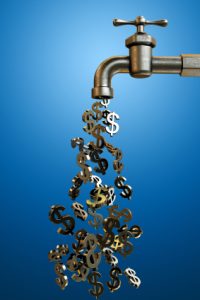 Liquidity and Expert Advisor
Liquidity and Expert Advisor
A particularly important factor in news trading. Applies to the model ECN / STP / MTF. Brokers offering access to average liquidity are completely unsuitable for this type of strategy. During data publication, macro-liquidity is strongly dispersed. The consequence are gaps in quotes, as well as temporary spreads widening. The greater the liquidity, the greater the chance of executing our order at a more favorable price. With MM / NDD brokers, the problem does not occur because they are a party to the transaction with the client.
Datafeed - called a source of quotes. In the case of an ECN / STP / MTF broker, quotations usually result from liquidity (although there are some exceptions). In the case of the MM and NDD broker, it is a "substitute" for liquidity. Quotes must be of very good quality - no holes, downtime, bad ticks, etc. etc .. Datafeed quality can be verified by going to a low interval (M1 or lower if possible) by comparing it with other brokers (only real accounts!). The more liquid quotes, the better for us.
Duration of the transaction
The shorter the time, the worse - for a broker of course :-). Transactions lasting less than 3 seconds are the bane of most brokers (even STP), especially if they are profitable. They are extremely difficult to hedge on the real market, which in turn leads to a conflict of interest between the broker and the client.
But how is it to choose a broker and finally how to choose it? Well, the matter is not simple. There are a lot of offers on the market, and time and limited capital. In the case of aggressive scalping trading, second transactions or news trading, you can delete brokers operating in the Market Maker model (you can try NDD but the chances are 10: 90). Thus, ECN, STP and MTF brokers remain, which are not short.
I know situations (from autopsy and not only) where one system with the same configuration of parameters at the same time not only achieved diametrically different results, but also did not coincide with the transactions concluded. The reasons for this are the factors described above. The fluidity and time of execution are criteria that cannot be seen with the naked eye, which is the biggest problem for us. They can only be measured through practice. And this is the answer to the question asked earlier. Test on small capital (microlyards in the offer are bowing) of our machine at the broker who has the greatest potential "on paper". If your liquidity or execution is limping, it's time to move on.
VPS from a broker and an Expert Advisor
 More and more brokers are offering their own or leased VPS. Can you rely on them? Traders are usually very skeptical about such offers. There are two concerns:
More and more brokers are offering their own or leased VPS. Can you rely on them? Traders are usually very skeptical about such offers. There are two concerns:
- The broker will "steal" the trader's system,
- The broker will specifically restart the VPS at key moments of the trader to make it more difficult to trade.
Theoretically, such phenomena are possible, but ... If we decide to cooperate with a broker we have such fears and suspicions about, we should change it as soon as possible, anyway. However, if it is only our caution, the cost of mental peace is around $ 10-20, because this is more or less the prices of servers per month.
VPSs provided by brokers usually do not belong to themselves. It is usually (but not always) a preferential agreement with an external service provider sponsored by our broker. So it is no different from the solution in which we buy VPS ourselves from supplier X. One of the most famous companies that works with many brokers is BeeksFX. The upside is that they immediately provide on their website the time of data transmission (ping) to the brokers' servers with whom they have signed a contract. Thanks to this, for "good morning" we know what to expect.
Diversification and Expert Advisor
This is the key to auto trading, and more. If you already have your perfected slot machine and you found the one and the best broker who seemingly came close to the ideal ... There is nothing else to do but start trading and cut coupons. But wait! After all, brokers can change the elements of their offer almost from month to month. Not only that, the execution of orders, spreads or liquidity provided by the broker can only deteriorate periodically, and this may even temporarily stop our trading. So is it wise to rely on one company? Nothing similar.
Be sure to read: Diversification of funds between brokers
Even if the second offer in the queue is apparently much worse than the dominant one, it is worth considering preparing an emergency account with her. An even better solution is to conduct parallel trading with both brokers in order to compare whether the strategy assumptions are implemented in the same way - it happens that with a seemingly worse offer our strategy for many different reasons (e.g. the execution time is shorter, the datafeed is more fluid) works better, and even generates more signals (!). Diversification is not security, but also a chance for additional progress.






















![Forex Club – Tax 9 – Settle tax on a foreign broker [Download the Application] Forex Club - Tax 9](https://forexclub.pl/wp-content/uploads/2024/02/Forex-Club-Podatek-9-184x120.jpg?v=1709046278)
![Trading View platform – solutions tailored to the needs of traders [Review] trading view review](https://forexclub.pl/wp-content/uploads/2024/03/trading-view-recenzja-184x120.jpg?v=1709558918)
![How to connect your FP Markets account to the Trading View platform [Guide] fp markets trading view](https://forexclub.pl/wp-content/uploads/2024/02/fp-markets-trading-view-184x120.jpg?v=1708677291)
![How to invest in ChatGPT and AI? Stocks and ETFs [Guide] how to invest in chatgpt and artificial intelligence](https://forexclub.pl/wp-content/uploads/2023/02/jak-inwestowac-w-chatgpt-i-sztuczna-inteligencje-184x120.jpg?v=1676364263)


![WeWork – the anatomy of the collapse of a company valued at $47 billion [WeWork, part II] wework bankruptcy story](https://forexclub.pl/wp-content/uploads/2024/04/wework-bankructwo-historia-184x120.jpg?v=1711729561)
![Adam Neumann – the man who screwed up Softbank [WeWork, part AND] adam neumann wework](https://forexclub.pl/wp-content/uploads/2024/04/adam-neumann-wework-184x120.jpg?v=1711728724)





![How to transfer shares to another brokerage office [Procedure description] how to transfer shares to another brokerage house](https://forexclub.pl/wp-content/uploads/2024/03/jak-przeniesc-akcje-do-innego-biura-maklerskiego-184x120.jpg?v=1709556924)

![The most common mistakes of a beginner trader - Mr Yogi [VIDEO] Scalping - The most common mistakes of a beginner trader - VIDEO](https://forexclub.pl/wp-content/uploads/2024/03/Scalping-Najczestsze-bledy-poczatkujacego-tradera-VIDEO-184x120.jpg?v=1711601376)
![Learning patience: No position is also a position - Mr Yogi [VIDEO] Scalping - Learning patience - No position is also a position - VIDEO](https://forexclub.pl/wp-content/uploads/2024/03/Scalping-Nauka-cierpliwosci-Brak-pozycji-to-tez-pozycja-VIDEO-184x120.jpg?v=1710999249)
![When to exit a position and how to minimize losses - Mr Yogi [VIDEO] Scalping - When to exit a position and how to minimize losses - VIDEO](https://forexclub.pl/wp-content/uploads/2024/03/Scalping-Kiedy-wyjsc-z-pozycji-i-jak-minimalizowac-straty-VIDEO-184x120.jpg?v=1710336731)



